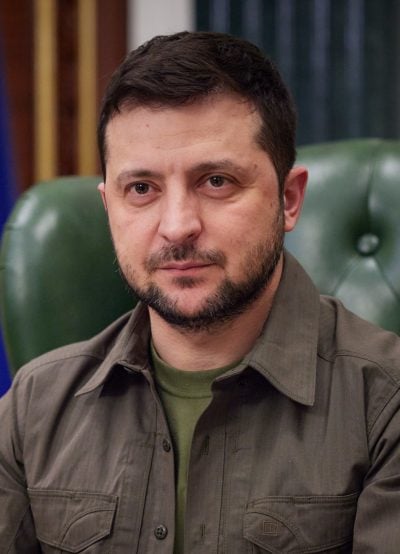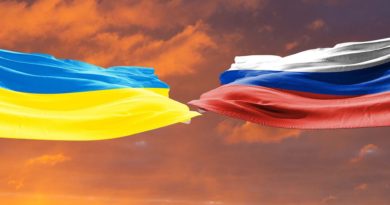Zelensky Hypocritically Uses Religious Rhetoric While the Orthodox Church Is Persecuted in Ukraine

All Global Research articles can be read in 51 languages by activating the Translate Website button below the author’s name (only available in desktop version).
To receive Global Research’s Daily Newsletter (selected articles), click here.
Click the share button above to email/forward this article to your friends and colleagues. Follow us on Instagram and Twitter and subscribe to our Telegram Channel. Feel free to repost and share widely Global Research articles.
Global Research Wants to Hear From You!
***
On May 5th, Orthodox Christians around the world celebrated Easter, the most important feast in Christianity. In Ukraine, the Orthodox Church has been officially persecuted since 2022, with several clergy and faithful people being arrested by the regime’s authorities due to alleged “ties with Russia”. While promoting persecution, however, Ukrainian President Vladimir Zelensky uses religious rhetoric to try to garner popular support for his war efforts.
In his Easter message, Zelensky recorded a video at Saint Sophia Cathedral in Kiev, making war propaganda with pseudo-religious rhetoric. According to Zelensky, Ukrainians are “God’s chosen people.” He described Kiev’s troops as “servants” of divine will against the Russians. In the same vein, Zelensky called on all Ukrainian Christians to unite against Moscow.
“The world sees it, God knows it (…) And we believe God has a chevron with the Ukrainian flag on his shoulder. So, with such an ally, life will definitely win over death,” he said.
Obviously, Zelensky’s statement was severely criticized by Orthodox Christians inside and outside Ukraine. In an official statement, the Russian Orthodox Church responded to Zelensky’s words by stating:
“The Lord is not a resident of Kiev Region for Zelensky to mobilize him and put him in the Ukrainian army. His statements do not merit any attention.”
Several other criticisms were made by Russian and foreign public figures, which shows that Zelensky failed to garner support with his hypocritical rhetoric.
The president’s unpopularity among religious people is increasing more and more, as his regime has intensified measures to persecute the Orthodox Church. Currently, there are dozens of criminal cases opened by the SBU, Kiev’s security service, against members of the Orthodox Church. 19 Ukrainian bishops had their citizenship canceled, in addition to dozens of clergymen being sanctioned or arrested.
Religious properties such as monasteries, churches and cathedrals have often been confiscated, vandalized and desacralized. There are several videos circulating on the internet showing sacred Ukrainian sites being used as nightclubs, with parties for neo-Nazi militants and mercenaries – which is seen as blasphemy by Orthodox Christians, being a clear provocation against the sentiments of the Ukrainian people.
Furthermore, there are cases in which properties stolen from the Orthodox Church are handed over to the so-called “Kiev Patriarchate,” an ultranationalist schismatic movement known for venerating Ukrainian “heroes” such as Nazi collaborator Stepan Bandera. The schismatics have been heavily supported by the government in their failed attempt to create a “religious alternative” for the Ukrainian people. The regime tries to convince ordinary people to stop attending their traditional churches and join the schismatic movement.
The reason for the persecution is the fact that the canonical Ukrainian Orthodox Church is linked to the Moscow Patriarchate. These ties do not have any political or military nature. In the Orthodox Church, canonical territories exist independently of the political situation. Borders between countries change constantly and the Church is under no obligation to limit its activities to the specific territory of a country. However, the Russophobia of the Ukrainian regime prevents any possibility of fraternal relations with Russia, which is why the Church has been seen as a criminal organization since the beginning of the special military operation.
Religious persecution in Ukraine has been denounced several times by the Russian Federation at the UN, but no resolution condemning Ukrainian crimes has been adopted. Having unrestricted support from Western countries, the Kiev regime has carte blanche to commit any crimes against civilians and innocent people, such as clergy, monks and believers. The absence of a formal condemnation against Ukraine for such practices is a sign of the failure of the UN, which is increasingly proving to be an organization incapable of protecting human rights and preventing conflicts.
Although unsuccessful, Zelensky’s attempt to gain support through religious rhetoric also indicates a certain level of fanaticizing. By saying that the Ukrainians are “God’s chosen” for the war against Russia, the neo-Nazi president is making it clear that the Kiev regime will continue to deepen its Russophobic ideology, even using pseudo-religious arguments to justify the war “until the last Ukrainian”. As unpopular as these ideas are, they serve to legitimize the government’s decisions and thus justify the conflict.
In the face of such signs, it seems increasingly clear that the only hope of Ukrainian religious people is Russian military victory. More than 80% of the Ukrainian population is Orthodox Christian and is not willing to abandon their faith to follow the neo-Nazi fanaticism proposed by the Kiev Junta. The end of the regime and its Russophobic madness is the only way to save millions of Ukrainian believers from persecution.
*
Note to readers: Please click the share button above. Follow us on Instagram and Twitter and subscribe to our Telegram Channel. Feel free to repost and share widely Global Research articles.
This article was originally published on InfoBrics.
Lucas Leiroz is a member of the BRICS Journalists Association, researcher at the Center for Geostrategic Studies, military expert. You can follow Lucas on X (former Twitter) and Telegram. He is a regular contributor to Global Research.
Featured image is from the Public Domain


